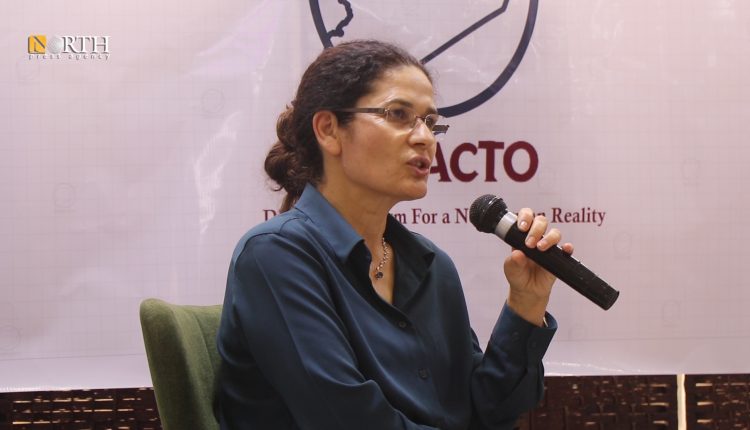Ilham Ahmed Confirms U.S.-Mediated Calm Between SDF and Turkey Amid Fragile Detente
By Kardo Roj
HASAKAH, Syria (North Press) – Ilham Ahmed, co-chair of the Department of Foreign Relations of the Autonomous Administration of North and East Syria (AANES), confirmed on Tuesday that a current de-escalation between the Syrian Democratic Forces (SDF) and Turkey is being sustained through indirect U.S. mediation, amid growing pressure to revive a broader regional peace initiative.
Speaking at a public dialogue session hosted by the policy-focused DEFACTO organization in Hasakah, Ahmed emphasized that the cessation of hostilities along the border is temporary and fragile, but represents a significant opening for broader diplomatic engagement.
“There is a current period of calm between our forces and the Turkish military, brokered with active U.S. involvement,” Ahmed stated. “This has helped halt further hostilities, including drone strikes and targeting of key civilian infrastructure.”
According to Ahmed, American diplomatic engagement has helped restrain further Turkish military action in the region, particularly in the aftermath of heightened drone activity and reported troop build-ups near Sere Kaniye (Ras al-Ain) and Tel Abyad earlier this year.
While denying reports of any direct negotiations taking place at Turkey’s Incirlik Air Base, Ahmed acknowledged the importance of continued U.S. facilitation in preserving the tenuous status quo. “We haven’t sent any delegation to Incirlik,” she said, “but efforts are underway to stabilize the situation and avoid a broader military escalation.”
Officials from the AANES have increasingly appealed to international actors, particularly Washington, to pressure Turkey to respect Syria’s territorial sovereignty and to avoid actions that jeopardize regional security and humanitarian conditions.
Ahmed also highlighted what she called a critical moment for reviving Turkey’s stalled internal peace process, particularly regarding its decades-long conflict with the Kurdistan Workers’ Party (PKK). “A just and inclusive peace process in Turkey is essential—not only for Kurds there, but for the stability of the entire region,” she said.
However, she criticized Ankara for what she described as “delays and a lack of genuine engagement” with existing peace initiatives. “Turkey has the primary responsibility to act if this process is to move forward,” Ahmed added.
Though she refrained from outlining any specific proposals, Ahmed’s remarks subtly reinforced AANES’s long-standing position: that dialogue and mutual recognition, rather than cross-border interventions, are key to achieving stability in northern Syria.
Turning to the issue of displaced civilians, Ahmed reaffirmed that the Autonomous Administration is committed to facilitating the safe return of residents displaced from Afrin, Sere Kaniye, and Tel Abyad—areas now under the control of the Turkish-backed Syrian National Army (SNA). However, she noted that conditions for return remain unsafe due to frequent reports of arbitrary detention and human rights violations.
“The return of the displaced is a priority,” Ahmed said, “but only under conditions that ensure safety, dignity, and protection from abuse.”
Independent human rights organizations, including Amnesty International and Human Rights Watch, have previously documented violations in these regions, including property seizures and enforced disappearances attributed to SNA-affiliated groups.
Addressing the AANES’s relationship with the central government in Damascus, Ahmed made clear that the administration is not militarily aligned with Syrian government forces but remains open to negotiations focused on achieving a decentralized political solution.
“We are pushing to implement the terms of previous agreements and ensure that government institutions, including Qamishli Airport and civil registries, are properly maintained,” she said. “Unfortunately, mismanagement by the new government has disrupted public services and increased local frustration.”
Her comments come amid growing local discontent over governance lapses in regime-controlled pockets of northeast Syria, as well as stalled talks between AANES and Damascus regarding political decentralization.
As regional actors maneuver within Syria’s fragmented landscape, Ahmed’s remarks underscore both the fragile gains made through recent diplomacy and the deep structural obstacles that remain.
While the SDF continues to play a central role in maintaining security and countering extremist threats, its political wing—represented by the AANES—seeks stronger international recognition and a long-term resolution that protects self-governance in northeast Syria.
The weeks ahead may prove pivotal: renewed Turkish military activity could unravel the current calm, while diplomatic inertia risks solidifying the status quo. In the meantime, the U.S. role as intermediary remains vital, and local authorities continue to call for international engagement that goes beyond short-term de-escalation.

